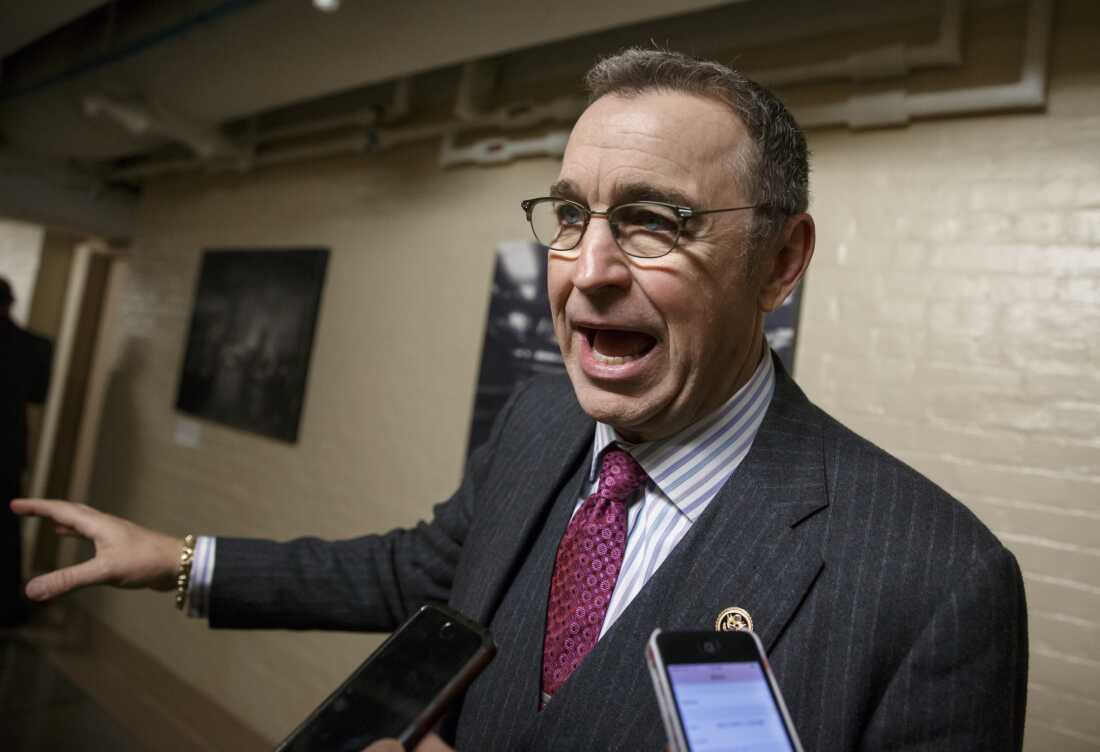
[ad_1]

Republican vice presidential candidate Sen. JD Vance, R-Ohio, speaks at the 2024 Republican National Convention on Wednesday in Milwaukee as Republican presidential candidate former President Donald Trump watches. There are more than a dozen so-called “fake electors” from several states serving as delegates at this year’s convention.
Carolyn Kaster/AP
hide caption
toggle caption
Carolyn Kaster/AP
In order to travel to the Republican National Convention in Milwaukee this week, three Arizona delegates needed permission from a judge.
That’s because GOP Arizona state Sens. Jake Hoffman and Anthony Kern, as well as Nancy Cottle, are among the 18 people indicted by an Arizona grand jury for their roles in an alleged scheme to upend the 2020 presidential election by throwing their state’s 11 Electoral College votes to former President Trump.
Hoffman, Kern and Cottle aren’t the only people in this situation who are at the convention in Milwaukee. Three delegates from Georgia, five from Nevada and two from Michigan also face charges for similar “fake elector” schemes in their respective states, according to an NPR review of delegate rosters and news reports.
Election deniers from Pennsylvania, New Mexico and Wisconsin are also present as delegates at the RNC.
A lawsuit was also filed in Wisconsin against those who cast fraudulent electoral college votes for Trump. But the case was partly settled after those fake electors agreed to formally state their actions were “part of an attempt to improperly overturn the 2020 presidential election results.”
The delegates’ roles in Milwaukee are largely ceremonial — on Monday, delegates from each state pledged their support for Trump as the Republican Party’s standard bearer in 2024.
But some former GOP officials say their presence is a stain on the party.

Then-Rep. Matt Salmon, R-Ariz. talks to reporters on Capitol Hill in Washington in this January 2015 file photo.
J. Scott Applewhite/AP
hide caption
toggle caption
J. Scott Applewhite/AP
“When those kinds of people are the ones that we’re sending from our state, here in Arizona, back to… the top brass of the Republican Party nationally? It reflects badly on us as a state, I believe,” said former congressman Matt Salmon.
In Arizona, it’s not just Hoffman, Kern and Cottle that worries Salmon.

There’s also Shelby Busch, the chair of Arizona’s RNC delegation, who earlier this year threatened to lynch a Republican elected official who’s defended the integrity of elections in Maricopa County.
And Liz Harris, the state’s elected Republican National Committeewoman, was expelled from the Arizona Legislature in 2023 for inviting a witness to present false charges about lawmakers and other state officials — including allegations of an election-related bribery scheme involving the Sinaloa drug cartel.
Sending Harris, Busch and others to the RNC is not what Salmon, who once served as chair of the Arizona GOP, would call putting the state’s “best foot forward.”
“It ebbs our credibility, and our integrity,” he said.
Gina Swoboda, the current chair of the Arizona Republican Party, doesn’t share those concerns. As for the three “fake electors,” Swoboda says such a thing “doesn’t exist.”
“That’s a made up leftist frame,” she said Monday from the convention floor. “We’ve always had alternate electors.”
What Hoffman, Kern and Cottle — the three indicted delegates — did was “in keeping with what we have done historically,” Swoboda added.
“They were proud to represent President Trump in 2020. Arizona stands by everyone who stood by President Trump. We would never do anything less,” she said.
Hoffman, an alternate delegate whose fellow Arizona Republicans elected him the state’s national committeeman, chalks up his indictment as a product of “the Democrats’ weaponization of our justice system” and vows he’ll be vindicated from “this naked political persecution.”
When asked if his presence at the convention was, as Salmon argued, a poor reflection of the Republican brand, Hoffman claimed the charges were part of a plot to divide the country.
“They are doing such a good job at it that an assassin attempted to assassinate President Trump just a few days ago. That is not something that we take lightly,” Hoffman said, adding that he has received death threats that he blamed on “the likes of Rachel Maddow and other insane leftists in the media.”


In Milwaukee, party officials have largely shied away from rehashing a four-year-old election loss. But Trump, too, has historically stood by those who attempted to upend his 2020 loss.
Kern, for instance, boasts of Trump’s 2022 endorsement for Arizona Senate in a recent ad for his 2024 congressional campaign. In it, Kern describes himself as a “hometown hero who actually did stand up for President Trump.”
And the former president has surrounded himself with election deniers, from his choice of vice presidential running mate — Ohio Sen. J.D. Vance has said he thought the 2020 election was “stolen from Trump” — to those seeking employment at the RNC.
Salmon worries that kind of continued acceptance of persistent election denialism will drive essential voters away from the conservative cause.
“I’m talking about the right-of-center voters who are independents, Democrats, and Republicans,” Salmon said “They want us to talk about real problems and making their future better. They don’t want to keep talking about, you know, what happened in the last election.”
[ad_2]